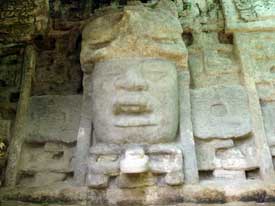Summer Travel Program
Field School in Prehistoric Archaeology in Belize
About the Program
This summer the Anthropology Department will offer a field school on Maya archaeology in Belize, Central America. The project area and field camp are located in a tropical rainforest within the Program for Belize Conservation Area - a protected reserve for flora, fauna, and archaeological remains.
In addition to more than 50 ancient Maya sites (ranging from hamlets to villages to large cities) the natural habitat contains a great variety of plant and animal life. According to the Belize Virtual Guide, "Troops of howler monkeys are often heard in the surrounding forests, and a rich bird fauna has been recorded."
Excavations conducted under the auspices of this regional project and through a research permit granted by the Institute of Archaeology and the Government of Belize have revealed a continuous prehistoric occupation from ca. 900 B.C. to 900 A.D.
Each season, the project concentrates on several different research interests. The 2008 summer season will include a number of different investigations, such as support population studies (survey, mapping, and excavation) at several localities, small site excavation, and the excavation of agricultural features. The UMass Boston group will be working at the site of La Milpa this summer season. The site is a large ceremonial center and the third largest Maya site in Belize. Students will rotate between excavation, laboratory processing and analysis.
Academic Credit
Successful participants will be awarded six undergraduate credits for the course (Graduate credit is also available):- ANTH 485/685, Field Research in Archaeology
- A supervised sequence of field research in archaeology. This research involves continuous study in a field situation directed by a professional anthropologist. The course may include attendance at field schools directed by qualified faculty outside the University, with permission of the department.
